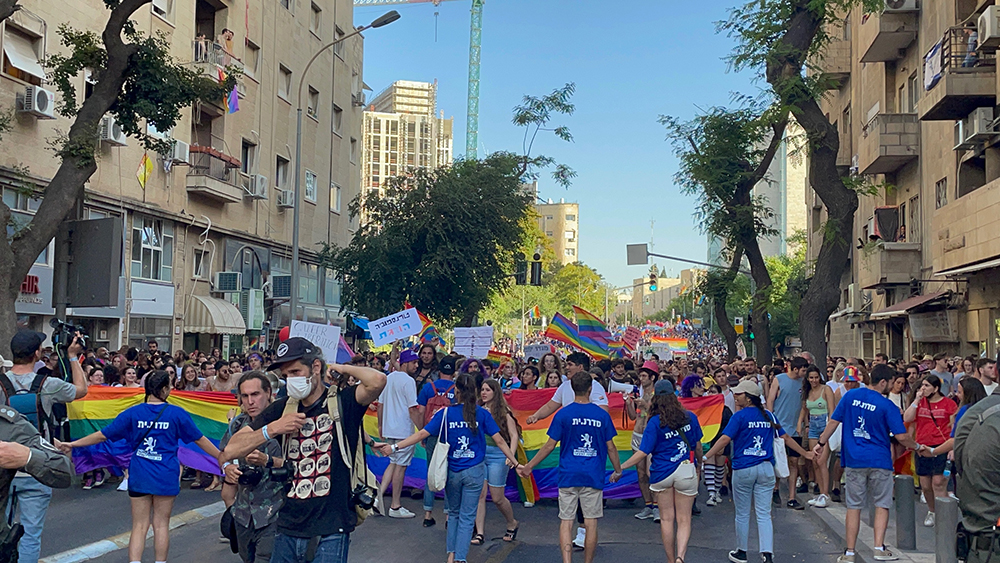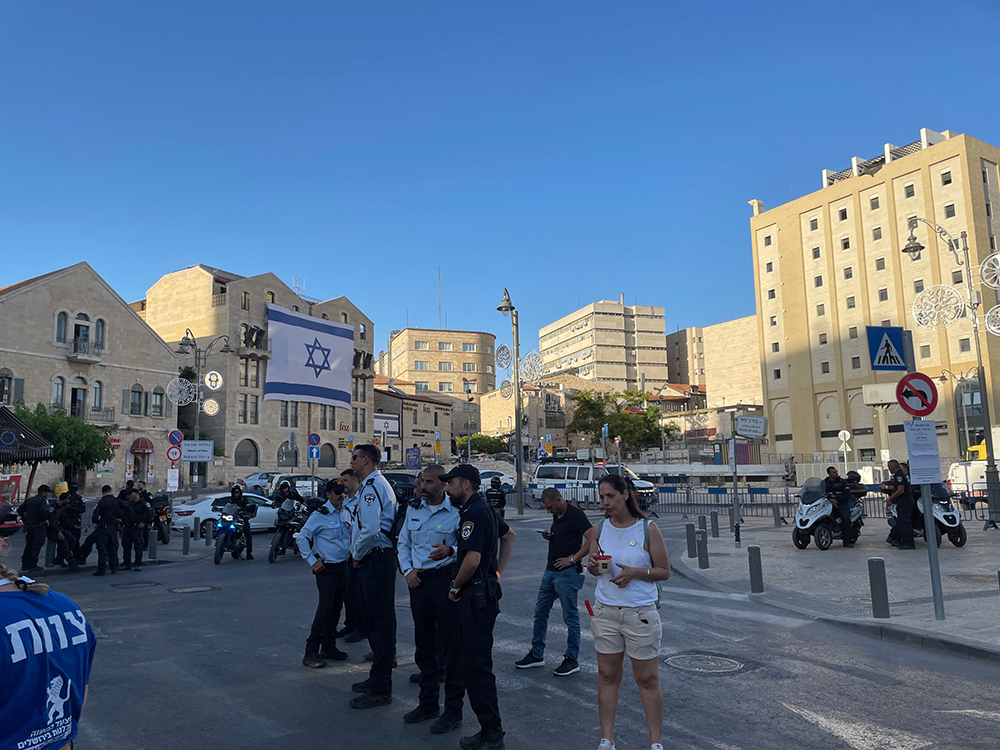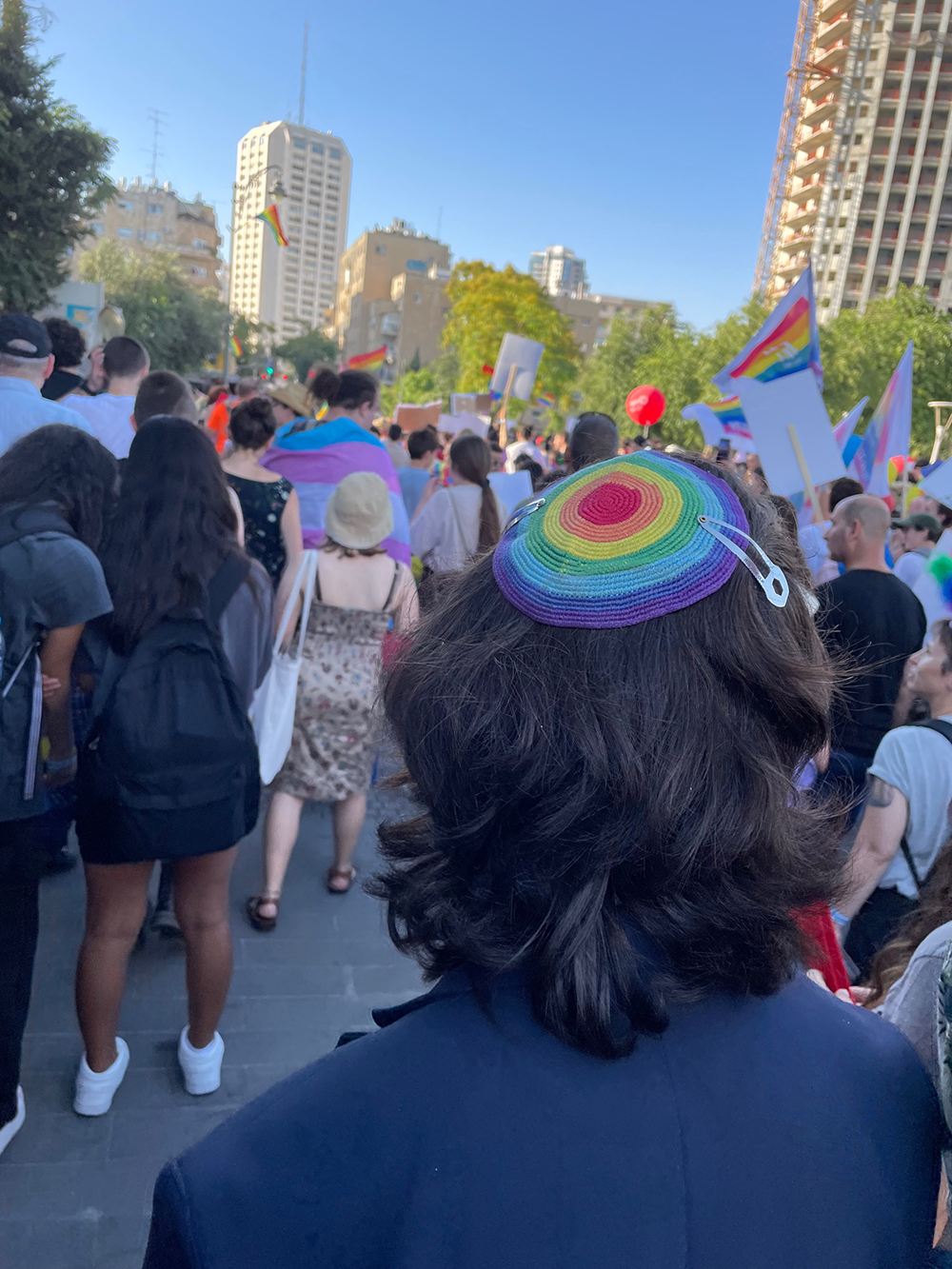Rainbow Flag in Jerusalem: Israel’s "Pride" Struggles for itself and Palestinians.
On June 10th, a large number of LGBT (lesbian, gay, bisexual and transgender) groups and their supporters held a grand rally in Tel Aviv, Israel’s most prosperous city. They marched along the main streets of Tel Aviv waving rainbow flags symbolizing minority groups. The "Pride Parade" held in Tel Aviv every summer is one of the most well-known events in Israel. Its scale is famous in the world, and sexual minorities from all over the world come to participate every year. Tel Aviv is one of the most friendly cities to LGBT people in the world. Every year, when the pride parade is held, almost the whole city of Tel Aviv enters carnival activities, and the streets and alleys are filled with rainbow flags.
However, in the holy city of Jerusalem, which is only an hour’s drive from Tel Aviv, its world-famous theme is always religious conflict and conservatism. Jerusalem has the largest orthodox Jewish community in the world, and the voices of sexual minorities are rarely heard. But what most people don’t know is that the "pride parade" has also been going on in Jerusalem for twenty years.
Different from the tolerance and revelry of freedom and openness of sexual orientation shown in Tel Aviv’s parade, the pride parade in Jerusalem is always carried out in protest and shouting. The author participated in the "Pride Parade" in Jerusalem this year, and deeply felt that the theme of this parade was not simply to support LGBT groups, but a struggle between a few Jewish secularists living in Jerusalem, the city known as "Israel’s eternal capital", and left-wing groups.
国旗游行 VS “骄傲游行”
就在特拉维夫“骄傲大游行”举行的十天前,6月2日星期四下午,众多以色列性少数群体,及持性开放态度的自由主义者在西耶路撒冷的自由钟公园(Gan HaPa’amon)集结,他们同样盛装打扮,同样挥舞着各式各样的彩虹旗与标语向耶路撒冷市中心最繁华的乔治王大街与独立公园(Gan HaAtsmaut)进发。

6月2日,耶路撒冷性少数群体的游行队伍。 本文图片均为 作者供图
对特拉维夫这样一座标榜国际化、自由化与世俗主义的现代都市来说,当彩虹旗挂满大街小巷时,标志着特拉维夫进入了狂欢节。同样的符号在耶路撒冷却完全不适用。但耶路撒冷也不甘寂寞,耶路撒冷的狂欢节便是以色列国旗飘扬在耶路撒冷全城之日。每年5月份左右,在耶路撒冷会举行盛大的国旗游行,以纪念1967年第三次中东战争以后以色列从阿拉伯人手中兼并东路撒冷,东西耶路撒冷重新合并为一个城市。理所当然,国旗游行的主题便是宣示以色列对耶路撒冷的主权,以及耶路撒冷是以色列“神圣而不可分割”的首都。
On the day of the national flag parade, the annual mandatory event is that a large number of young Israelis wave the national flag of Israel’s blue and white satellite and flood into Damascus Gate, the Palestinian-inhabited area of Jerusalem, and cross the Muslim area of the old city to reach the Western Wall, the holy place of Judaism. The whole process vented contempt and hatred for the Palestinians. On May 29th this year, a grand flag parade was just held in Jerusalem.
It seems that there are some feelings of singing against the national flag parade. Just five days later, on June 2, the "Pride Parade" followed in Jerusalem. However, unlike the flamboyant style and joyful atmosphere of the national flag parade, the "Pride Parade" appeared tense and angry in the holy city. In order to ensure the safety of the "Pride Parade", the Israeli police blocked all intersections along the parade, and they were guarded by police at intervals. A friend who took part in the parade told me, "I feel that there are more policemen in Jerusalem than people who took part in the parade."
Such a large-scale police protection is due to the fact that in the "pride parade" in Jerusalem in previous years, ultra-orthodox Jews often attacked the "pride" who participated in the parade. They thought that support for homosexuality was not allowed in religion, and these "unclean" people marched in the holy city completely blasphemed God and defiled the holy city. Even the "proud people" who participated in the parade were killed by Jewish orthodox extremists who opposed the parade.

Police on the streets of Jerusalem
Therefore, very different from Tel Aviv, the "Pride Parade" in Jerusalem not only has strict security measures, but also the participants’ emotions are mainly anger, and the slogan also highlights the "equal rights" for sexual minorities.
The slogan most frequently shouted in this parade is "Achad Shtaim Achad Shtaim Ga ‘avah Beyerushalaiim". The implication of this slogan is self-evident, that is, in ordinary times, sexual minorities are not proud in Jerusalem, but live in verbal abuse and personal attacks by various religious groups. Many slogans related to religious issues were also displayed in the procession, such as "Experience the Magic of Creation" and "Chaviv Adam SheNivrah BeTselem". There were also marchers who changed the small round hat (Kippa) worn by Jewish men, one of the symbols of Judaism, into a rainbow color. Obviously, this kind of parade is a protest and demonstration against the religious conservative groups that dominate in Jerusalem. The purpose of the marchers is not only equal rights for sexual minorities, but also the pursuit and maintenance of the secular lifestyle.

A rainbow-colored round hat (Kippa)
It’s not just about the LGBT community
What is even more shocking to the author is that this demonstration shows not only the resistance of secularism and religionism, but also the sympathy for the Palestinians. There are also people in the parade shouting "Enough military occupation!" (Daii LeKibush), "It is illegal to expand settlements!" (Ma’achaz Lo Chuqi) and other slogans of the Israeli left-wing camp. These slogans reflect the affirmative movement pursued by this March, not only for Israel’s sexual minorities, but also for the wider oppressed Palestinians.
These slogans also give us a deeper understanding of this pride parade: that is, different attitudes towards LGBT groups are a microcosm of Israel’s complicated and divided internal politics.
The pride parade in Tel Aviv and Tel Aviv people’s support for the parade not only represent Tel Aviv’s opening and internationalization, but also represent the opposition of secularist groups and left-wing political groups symbolized by Tel Aviv to religious groups and right-wing political groups represented by Jerusalem. Israeli society can also maintain its own pluralism and democracy in such polarization and opposition. In order to vividly describe the extreme division and diversification of Israeli society, some scholars have put forward the concepts of "internationalized Tel Aviv" and "jihadist Jerusalem".
This year’s pride parade in Jerusalem can show the momentum of tit-for-tat with the flag parade, and it is also related to the great changes in Israeli politics.
In June last year, the new Israeli government was established, which ousted former Prime Minister Benjamin Netanyahu and his conservative right-wing political and religious ruling Coalition, and formed an "all-political spectrum ruling Coalition" that transcended the ideological dispute between the left and the right. Holovitz, the current Israeli Health Minister, fully demonstrated the political significance of this "Pride Parade". Because Holovitz himself is a homosexual and the leader of the left-wing Jewish party Meretz.
Holovitz’s political party is one of the important members of the current government and controls the Israeli Ministry of Health. At the moment when the epidemic is raging, the first important thing that Holovitz did after he became the Minister of Health was not to target Covid-19, but to approve the inclusion of blood donation of healthy homosexuals in the blood bank. This policy fully shows that one of the aims of Meretz Party is to strive for equal rights for LGBT groups and eliminate discrimination against sexual minorities in Israeli society. What’s more, another aim of the party is to pursue the coexistence of Arabs and Jews and peace between Israel and Palestine.
The sympathy of the "proud people" for the Palestinians has indeed won many Palestinians’ recognition of Israel. Because in Palestinian society, like orthodox Judaism, Islam’s attitude towards sexual minorities is extremely conservative and strict. Therefore, some Palestinian sexual minorities choose to embrace Israel in pursuit of personal freedom and normal life. I once interviewed a Palestinian student studying in Hebrew University. He came from a traditional Muslim family in East Jerusalem. His grandfather was a Palestinian refugee in exile in the Gulf countries, and he was able to return to Jerusalem with his family in the 1990s. However, he abandoned these "proud" identities of many Palestinians and chose to apply for Israeli citizenship. The reason he told is simple: "Because I am a homosexual, I am very sad to live the life I want in the Palestinian community. I prefer the Israeli society because it is more friendly to homosexuals."
It sounds like he can be a "real pride" in Israel. Therefore, it may not be difficult for us to understand the increasing number of Palestinians applying for Israeli citizenship every year released by some Israeli institutions in recent years. These people may not all be LGBT groups, but they are more likely to be individualists who pursue secular life. They may think that in another more diversified and open society, they can have more opportunities to pursue the secular lifestyle they want.
(Liu Bingchen, Ph.D. student, Department of Political Science, Hebrew University, Israel)